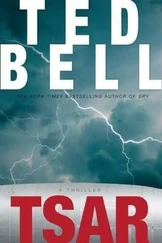Ted Bell - Phantom
Здесь есть возможность читать онлайн «Ted Bell - Phantom» весь текст электронной книги совершенно бесплатно (целиком полную версию без сокращений). В некоторых случаях можно слушать аудио, скачать через торрент в формате fb2 и присутствует краткое содержание. Жанр: Триллер, на английском языке. Описание произведения, (предисловие) а так же отзывы посетителей доступны на портале библиотеки ЛибКат.
- Название:Phantom
- Автор:
- Жанр:
- Год:неизвестен
- ISBN:нет данных
- Рейтинг книги:3 / 5. Голосов: 1
-
Избранное:Добавить в избранное
- Отзывы:
-
Ваша оценка:
- 60
- 1
- 2
- 3
- 4
- 5
Phantom: краткое содержание, описание и аннотация
Предлагаем к чтению аннотацию, описание, краткое содержание или предисловие (зависит от того, что написал сам автор книги «Phantom»). Если вы не нашли необходимую информацию о книге — напишите в комментариях, мы постараемся отыскать её.
Phantom — читать онлайн бесплатно полную книгу (весь текст) целиком
Ниже представлен текст книги, разбитый по страницам. Система сохранения места последней прочитанной страницы, позволяет с удобством читать онлайн бесплатно книгу «Phantom», без необходимости каждый раз заново искать на чём Вы остановились. Поставьте закладку, и сможете в любой момент перейти на страницу, на которой закончили чтение.
Интервал:
Закладка:
Once inside Lubyanka, Hawke was whisked through security by Putin’s aides and taken to a nicely furnished office on the fourth floor. It was a corner office overlooking the square where the monument to Felix Dzerzhinsky, famous as the first director of the Bolshevik secret police, known as the Cheka, had once stood. Under his rule, the agency quickly became known for torture and mass summary executions.
And they’d built a monument to him! Hawke thought, suddenly acutely and uncomfortably aware of exactly where he was.
He was offered tea or vodka and a comfortable chair by the window. Shortly, he was introduced to the young woman, Svetlana, who would serve as his interpreter. She was wearing the white shirt, black tie, and tight-fitting grey gabardine uniform that seemed to be de rigueur among the women who worked here. Another officer entered. Hawke was then relieved of his weapon and his mobile phone. No one even asked to see his papers, which, in Russia, was miraculous.
“Your first visit to Lubyanka?” Svetlana asked, sipping her tea, with idle curiosity.
“Yes. I’ve been looking forward to it.”
“Really? Why?”
“My son was born here. I wanted to see what it was like.”
She had no reply to that.
“Shall we get this over with?” Hawke finally said.
“Of course. I’m sorry. I thought you wanted to finish your tea. The elevator is just down the hall.”
“Good,” he said, getting to his feet and following her out into the hallway.
“Don’t be shocked by Captain Lyachin’s appearance,” Svetlana said as they descended in the elevator. “He’s been through quite an ordeal, you know.”
“I can only imagine,” Hawke said dryly.
Not picking up on the Englishman’s irony, she smiled and said, “Here we are!” in such a cheery manner that you might have thought the lift had arrived at the children’s nursery, full of laughter and playful sounds of joy. As they walked down the long green-walled corridor, Hawke kept expecting to hear long, hideous screams from behind the doors, but all was quiet. They probably did the real dirty work someplace else. Yes, of course, the basement from which you could see Siberia.
Svetlana finally paused at the end of a corridor before one of the ubiquitous green doors. She rapped three times. A scowling uniformed guard pulled the door open. She had a brief but firm conversation with him in Russian, and the man finally left them alone with Lyachin, clearly not happy about it.
The captain was facing them, sitting behind a simple wooden table with two chairs on the opposite side. He looked like a dead man, his skin sallow and grey, his eyes puffy with lack of sleep, his cheeks sunken and hollow. He had his chin down on his chest and was staring at the table.
“Captain Lyachin, I’m very pleased to meet you,” Hawke said, taking a seat and extending his hand across the table. Svetlana translated this and the man raised his head slightly and stared at Hawke in some amazement. Here was someone who was actually smiling at him and offering to shake his hand. With great timidity, he reached across and shook Hawke’s hand, quickly snatching it back.
Hawke noticed that there was no water. He asked Svetlana if they might have a large pitcher of water and three glasses. Lyachin, whose lips were parched white, appeared to be literally dying of thirst. The interpreter went to the door, spoke to the guard outside, and the water appeared a few moments later.
Hawke began speaking to the Russian captain, pausing so that Svetlana could translate, then waiting for Lyachin’s answer to be translated before speaking again.
“My name is Commander Alex Hawke, Captain. I am here to hear the truth about what transpired in the Caribbean. If I believe you, I will do my best to convince people in both your government and mine that what you are saying is what actually happened aboard the Nevskiy. Understood? In other words, I am here to try to help you.”
Svetlana translated this and the man nodded his head in understanding.
“Let me get this out of the way before we go any further, Captain. You are absolutely convinced that what happened aboard your boat is not in any way the result of human error on the part of you or your crew. Correct?”
“Correct.”
“You say that the responsibility for the disaster lies with some kind of… intervening force… that assumed control of all your submarine’s systems, including weapons, yes?”
“Yes.”
“This is the root of your problem, Captain. No such force exists. No such technology exists. Certainly the Americans don’t possess it. Yet you blame Captain Flagg Youngblood of the U.S. Navy sub Texas for what happened.”
“ Nyet. I have been thinking about this since being thrown in prison. I know the American, Captain Flagg Youngblood, very well, though we have never met. He would never use this power to take control of my boat and use it to sink one of his own country’s vessels. Never. I was a fool to ever even suggest such a thing.”
“Ah, good. I was having a lot of trouble with that one, too. So. Do you have a new theory to replace the old one?”
“I do.”
“Please. Let me hear it.”
“Are you familiar with the term ‘Stuxnet worm’?”
“I am. It was the computer virus, or malware, that secretly invaded the Iranian nuclear facility at Natanz. It is a cyberweapon that is written specifically to infect and attack systems used to control and monitor industrial processes. Like the Iranian centrifuges that were damaged without any harm to the systems controlling them at all.”
“Yes. Stuxnet had the ability to reprogram the programmable logic controllers, the digital computers that control onboard systems and, most important, hide its changes. So it is impossible to discover or prove who has infected you. When it was reported, Stuxnet was called ‘the code that explodes.’ And the Iranians have finally admitted that it caused extensive damage to their nuclear centrifuges.”
“You believe that the Nevskiy was the victim of just such an attack, but on a much more sophisticated level.”
“I do. But of course I can’t prove it, and so I will go before the firing squad.”
“But how would such a virus ever get aboard your boat? You’re submerged most of the time.”
“I’ve no idea. But I do have a viable theory. We were laid up some weeks in Venezuela for repairs. You are certainly aware that President Hugo Chavez is no friend of the Americans. So. An infected memory stick given to one of my crewmen by someone in the Venezuelan military wishing to cause an international incident. Maybe. I don’t know.”
“A distinct possibility. Or, perhaps it was secretly smuggled aboard by one of your own crewmen who himself wished, for whatever his reasons, to attack America.”
“That is entirely possible. I love my men. But I cannot vouch for the sanity or loyalty of each and every one.”
“Tell me, Captain, is there anything else regarding this incident that I need to know?”
“Well, yes, as I endlessly reconstructed the events in my mind, something did occur to me that may have been relevant, I don’t know-”
“At this point, everything is relevant, Captain.”
“Prior to the takeover, Ivanov-Pavlov, my executive officer, informed me that we were getting repeated power spikes from our reactor. On a regular basis. But he could see no indication of anything amiss on any of the monitoring systems, nor variances in the cooling systems. Nor did the surges affect normal functions and operations of the digital computers that controlled all onboard systems. Sound familiar, Commander?”
“It does indeed, Captain. Sounds just like the Stuxnet worm at Natanz taken to a far higher order of magnitude. Your sub is vastly more complex than a nuclear centrifuge. It’s common knowledge that there’s a new arms race, a race to be the first to wage war with cyberweapons.”
Читать дальшеИнтервал:
Закладка:
Похожие книги на «Phantom»
Представляем Вашему вниманию похожие книги на «Phantom» списком для выбора. Мы отобрали схожую по названию и смыслу литературу в надежде предоставить читателям больше вариантов отыскать новые, интересные, ещё непрочитанные произведения.
Обсуждение, отзывы о книге «Phantom» и просто собственные мнения читателей. Оставьте ваши комментарии, напишите, что Вы думаете о произведении, его смысле или главных героях. Укажите что конкретно понравилось, а что нет, и почему Вы так считаете.












